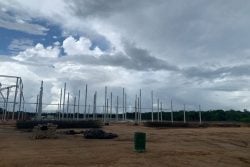BEIRUT, (Reuters) – Lebanese veteran politician Saad al-Hariri was named prime minister for a fourth time today and pledged to form a new government that can tackle the country’s worst crisis since its 1975-1990 civil war.
After his nomination, Hariri said he would quickly form a cabinet of specialists “with a mission to enact the economic and financial reforms” set out in a French roadmap to unlock foreign aid.
But he faces major challenges to navigate Lebanon’s sectarian politics to agree a cabinet, which must then fix a mounting list of woes: a banking crisis, currency crash, rising poverty and crippling state debts.
A new government will also have to contend with a COVID-19 surge and the fallout of the huge August explosion at Beirut port that killed nearly 200 people and caused billions of dollars of damage.
At 50, Hariri has already served three terms since 2009 as premier – a post reserved for a Sunni Muslim in Lebanon’s power-sharing system. His last coalition cabinet was toppled almost exactly a year ago as protests gripped the country, furious at the ruling elite for decades of state graft and waste.
Hariri, the sole candidate in Thursday’s talks, was backed by a majority of parliamentarians.
“I tell the Lebanese who are suffering from hardships to the point of despair that I am determined to work to stop the collapse that is threatening our economy, our society and security,” he told reporters.
The nomination of Hariri, long aligned with Western and Gulf states, follows weeks of political wrangling that has delayed a deal on a new government. He was backed by his own Future Movement, the Shi’ite Amal party, Druze politician Walid Jumblatt’s party and other small blocs.
The heavily armed Shi’ite group Hezbollah, which took part in Hariri’s last cabinet, did not nominate anyone but said it would facilitate the process.
“We will contribute to maintain the positive climate,” said Mohammed Raad, head of Hezbollah’s bloc. Together with its allies, including Amal and Aoun’s party, they hold a majority in parliament.
Lebanon’s two main Christian blocs did not nominate Hariri. The Free Patriotic Movement, led by Aoun’s son-in-law, said a veteran politician could not lead a technocrat government.
Its rival the Lebanese Forces, the second biggest Christian bloc and a staunch Hezbollah opponent, also declined to name him. “Has this political class that took people hostage learned they cannot continue in this way?” MP Georges Adwan said.
Former colonial power France has tried rallying Lebanon’s sectarian leaders but has been frustrated by the apparent lack of urgency or progress.
Hariri has presented himself as the “natural candidate” to build a cabinet that can revive the French plan, which lists long-neglected reforms and calls for resuming IMF talks.






